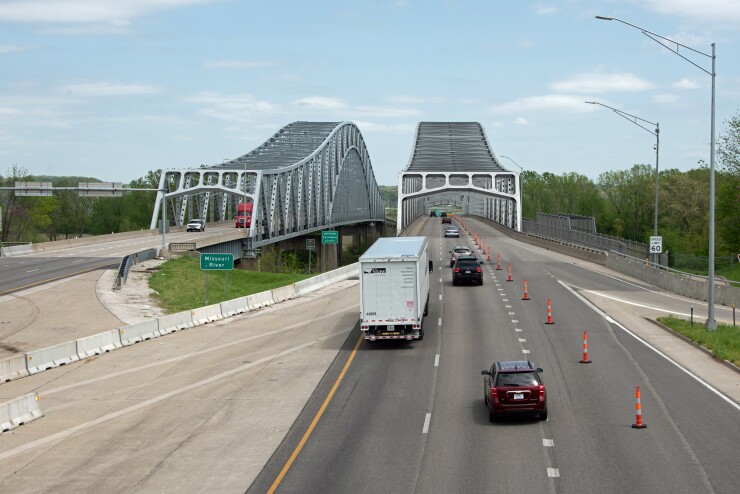Missouri transportation officials expect to tap a $300 million bonding authorization for bridge work later this fiscal year as they try to cobble together funding amid the unwillingness of the state's citizens to approve revenue to take care of their transportation infrastructure.
Missouri Gov. Mike Parson, a Republican, and the GOP-controlled legislature signed off on the $300 million of borrowing along with $50 million of state general funding for bridges this spring. Parson originally proposed in his fiscal 2020 budget $350 million of borrowing capacity.

It’s a rarity for the AAA-rated state that holds a tight leash on new borrowing authority and the bonding authority marked a first for the state in which lawmakers agreed to tap general state revenue to repay Missouri Highways and Transportation Commission debt. The agency’s debt is otherwise repaid with state road funds and federal grants.
Proceeds of the sale by the commission will finance the repair or replacement of 215 bridges across the state.
“Our intent is to do one bond issue for the full amount and we continue to look at our timeline as we work to get in place what’s needed under the legislation,” said Missouri Department of Transportation Chief Financial Officer Brenda Morris. The commission has authority over MoDOT, the state highway system, and all state transportation programs and facilities.
Under the legislative deal, the commission was required to secure a federal grant for the $240 million replacement of the nearly 60-year-old Interstate 70 bridge over the Missouri River near Rocheport.
The U.S. Department of Transportation’s approval in late July of an $81.2 million of Infrastructure for Rebuilding America, INFRA, grant for the bridge provided the trigger needed to allow the bond sale to go forward, but a funding gap for that project and another one still must be filled.
“We are still working to put together the finance plan” with the expectation that the pieces will be in place by October, Morris said. “I think the legislature would like to see the complete financing plan in place before we issue any debt.” The gap is about $100 million and the commission is pursuing several avenues including a state infrastructure bank loan.
The commission may sell the bonds competitively.
If it goes with a negotiated sale, it would draw from an existing banking pool. PFM Financial Advisors LLC advises the commission. No refundings are on tap after the commission’s competitive sale of $103 million to refund grant anticipation revenue vehicle state road bonds earlier this year.
The commission’s senior lien road fund bonds carry triple-A ratings and its federal reimbursement road bonds carry ratings are in the double-A category. The state carries triple-A ratings.
The borrowing and general fund cash will allow existing funds to be re-allocated to finance local road and bridge projects considered a priority. In addition to the bonding capacity lawmakers allocated $50 million for a transportation cost-share program with local communities.
The Missouri Department of Transportation late last month received federal word that it won a $20.7 million grant under the new USDOT’s Competitive Highway Bridge Program. Proceeds will finance the replacement of 40 bridges in northern rural areas. Only 25 states were eligible to apply for the $225 million in the program grants: those with a population density of 100 or less per square mile. The grant also required bridges be bundled in a single contract. MoDOT intends to pursue a design-build contract to deliver this project.
For the cash-starved commission, the infusion of bond proceeds and federal grants is much needed. “We are trying to turn over every rock,” Morris said.

The commission’s last new money sale dates back to 2010 when it exhausted state approved bond capacity based on its existing funding streams and it has since focused primarily on maintenance work.
Lawmakers and voters have been stingy.
Voters last fall rejected Proposition D, which asked if the state should raise the gas tax to fund long-stalled road and bridge projects. The 10-cent-per-gallon hike would have been phased in over four years, generating $123 million annually for cities and counties and $288 million for the state. The gas tax has stood at 17 cents per gallon for more than two decades.
In 2014, voters shot down Constitutional Amendment 7, which would have raised the state’s sales tax by three-fourths of one cent for 10 years to fund transportation. It would have raised $5.4 billion with about 10% going to counties. The gasoline tax would have been frozen during the 10-year period.
A roughly $800 million annual shortfall to cover high priority road and bridge needs exists and officials have warned it’s now a safety issue. The commission has $8 billion to $10 billion of unfunded long-term needs.
“This is a great shot in the arm to make a targetable improvement and the commission appreciates it,” Morris said of the new bonding. “Our challenge is that there is just a tremendous demand for system improvements. This does not solve the transportation funding issue.”

Missouri has 10,385 bridges, the sixth most in the nation, and more than 900 are in poor condition while 1,194 are weight-restricted with 450 falling into both categories, according to MoDOT.
The 2020-2024 statewide transportation improvement program known at STIP underscores the commission’s funding struggles and worries over federal funding.
STIP lists 1,872 highway and bridge projects that are planned by state and regional agencies. Missouri has the seventh-largest state highway system with 33,859 miles of roadways and 10,385 bridges, but ranks 48th nationally in revenue per mile.
The annual construction program averages $924 million per year for the five-year period.
“This STIP recognizes the serious consequences to our plans if policy makers in Washington are unable to fix the Highway Trust Fund. In Missouri, that puts $613 million of projects including 5,423 lane-miles of roadway improvements and 55 bridge projects in jeopardy in FY 2021 and 2022,” MoDOT Director Patrick McKenna said in a statement when the plan was approved by the commission in July.
Missouri’s transportation revenue totaled nearly $2.6 billion in fiscal 2018, with nearly two-thirds of the revenue coming from state user fees and one-third from federal revenue. Funds go into five “buckets” for various transportation purposes including state agencies, local governments, debt service, state roads and bridges, and multi-modal projects.
The federal Highway Trust Fund's struggles are a source of concern.
With the federal fuel tax frozen, it has long fallen short of its promise of fulling funding transportation projects.
Transit agencies face a federal funding cut of about 12% unless Congress completes work this month on a 2020 fiscal budget or, as is more likely, passes a stopgap budget that keeps spending level until late November. In addition, federal highway programs are facing
Missouri's $30 billion budget for the fiscal year that began July 1 includes a $10.2 billion general revenue fund with an anticipated $185 ending balance. The budget also funded a 3% raise for employees and kindergarten through 12th grade education funding was raised by $61 million to $3.5 billion.
In signing the budget, Parson said: "They have created a fiscally-responsible, balanced budget that will move Missouri forward.”





